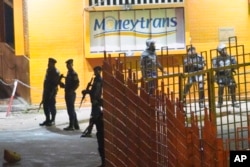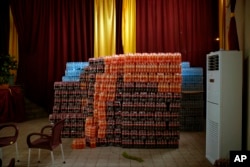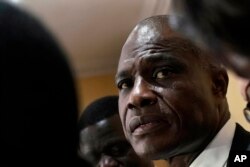The U.S. embassy in the Democratic Republic of Congo is warning Americans to leave the country, as Congolese officials prepare to announce election results.
The embassy in Kinshasa posted an alert Wednesday that said Americans in Congo should make departure plans that do not rely on U.S. government assistance. It urged Americans to avoid large crowds and demonstrations, and monitor local media for updates.
Congo's election commission has said it will announce results of the Dec. 30 election at 11 p.m. local time Wednesday.
Riot police began to gather outside election commission headquarters in Kinshasa on Wednesday afternoon as officials, who had met overnight, promised an announcement of provisional results.
In usually bustling Kinshasa, shops were shuttered. Provisional results were originally due several days ago, but officials said they were still counting ballots from the poll.
Congo on edge
The delays and other missteps have taken the election out of the realm of reality and into the murky world of rumor and speculation, analyst Richard Moncrieff of the International Crisis Group. And that, in a country as politically heated as Congo, is dangerous.
"The rumor mill is working at full-tilt, even despite the partial shutdown of all internet services in the country, and this obviously is unhelpful as people will produce evidence that they think favors their candidate, and so forth," he told VOA.
Already, the influential Catholic Church, which deployed 40,000 observers throughout the country, fueled tensions by saying more than a week ago that it had identified a clear winner, and urged the electoral commission to make an announcement.
That led to speculation that the ruling party favorite, Emmanuel Ramazani Shadary, had lost the poll. He is the hand-picked successor of longtime President Joseph Kabila, who has remained in office more than two years beyond his mandate because of repeated delays in holding the election.
On Wednesday, as officials prepared to announce results, the presidents of South Africa and Zambia met to urge the electoral commission to "speedily finalize the vote tabulation and release the election results in order to maintain the credibility of elections."
Stephanie Wolters, a longtime Congo analyst for the Institute for Security Studies, questioned the timing of their statement, and its effect.
"It really comes at a bizarre time," she told VOA. "For [Cyril] Ramaphosa and Edgar Lungu to be engaging at this level about the DRC elections over 10 days after that election took place just seems like a hasty, last-minute afterthought to sort of put it on record that [regional bloc] SADC is doing something. The kind of statement they came out with today is the kind of statement they could have come out with weeks ago, without really having to meet with one another because there's nothing controversial in it, and nothing unusual and nothing particularly strong."
Delay 'all about Kabila'
Moncrieff says the vote-counting delay is similarly unconvincing. The head of the electoral commission, Corneille Nangaa, is known to be fiercely loyal to Kabila.
"They are using the fact that they have not counted 100 percent of the vote as a pretext to play for time to allow Kabila to make what's a political and not a technical decision," he said. "Kabila will tell Nangaa who to declare winner. And Nangaa will follow that. So this is all about Kabila. Any delay is a political delay and it's a delay because [of] Kabila, who after all hates making decisions and always tries to delay decisions."
Congolese politics has always been a rough game. Kabila took power after the assassination of his father, who himself took power in a coup over totalitarian leader Mobutu Sese Seko.
Moncrieff hopes this vote will have a more peaceful outcome.
"What's at stake here is the winner-takes-all structure of Congolese politics, and that's what makes people so afraid of losing," he said. "And I think it's beholden on the political actors to make statements that are inclusive to try to attenuate the winner-takes-all problem."
That does not appear to be happening now, with opposition candidate Martin Fayulu, who many projected to be the winner of the poll, saying this week that "the election results are not negotiable."
But negotiation seems to be an unknown concept in Congolese politics. When VOA reported from Kinshasa last month, the two leading presidential camps — Shadary and Fayulu — were asked if they would be interested in forming a coalition government in the future, or even working closely with their political opponents once in power.
Both dismissed the idea.







